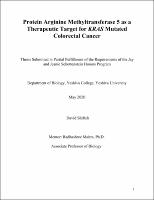Please use this identifier to cite or link to this item:
https://hdl.handle.net/20.500.12202/5647Full metadata record
| DC Field | Value | Language |
|---|---|---|
| dc.contributor.advisor | Maitra, Radhashree | |
| dc.contributor.author | Shifteh, David | |
| dc.date.accessioned | 2020-06-11T21:06:40Z | |
| dc.date.available | 2020-06-11T21:06:40Z | |
| dc.date.issued | 2020-05 | |
| dc.identifier.citation | Shifteh, David. Protein Arginine Methyltransferase 5 as a Therapeutic Target for KRAS Mutated Colorectal Cancer. Thesis Submitted in Partial Fulfillment of the Requirements of the Jay and Jeanie Schottenstein Honors Program Department of Biology. NY: Yeshiva College, Yeshiva University May 2020. Mentor: Radhashree Maitra, Ph.D. Associate Professor of Biology. | en_US |
| dc.identifier.uri | https://hdl.handle.net/20.500.12202/5647 | |
| dc.description | Senior honors thesis. Open Access. | en_US |
| dc.description.abstract | Abstract Colorectal cancer (CRC) is the third most commonly occurring cancer globally. One of the current therapies used in CRC treatment is the anti-epidermal growth factor receptor (anti- EGFR) monoclonal antibody, which is commercially marketed as cetuximab. However, cetuximab has been seen to be detrimental for patients who have CRC with a mutated KRAS gene. ==== The RAS signaling pathway is involved in many cellular processes including cell proliferation. A driver mutation in the KRAS gene causes the protein to become overactive and drives abnormal cell growth and proliferation. Nearly 45% of colorectal cancer (CRC) patients harbor a mutation in their KRAS gene, for which despite many years of research, there are still no drugs available. Other treatments that indirectly target mutant KRAS are thus highly sought after and much needed. ==== Protein Arginine Methyltransferase 5 (PRMT5) is a transcription regulator for multiple cellular processes that is currently being tested as a potential target/biomarker in several cancer types. PRMT5 has been found to be over-expressed in various cancers, and PRMT5 overexpression is also correlated with increased cell growth and decreased patient survival. ===== Herein we have found that not only do KRAS mutant CRC cells respond effectively to PRMT5 inhibitor treatment, but that KRAS mutant CRC cells show an even greater degree of inhibition, apoptosis, and cell cycle arrest when compared to their KRAS wild type (WT) counterparts after being treated with PRMT5 inhibitor. | en_US |
| dc.description.sponsorship | Jay and Jeanie Schottenstein Honors Program | en_US |
| dc.language.iso | en_US | en_US |
| dc.publisher | New York, NY: Yeshiva College. Yeshiva University. | en_US |
| dc.rights | Attribution-NonCommercial-NoDerivs 3.0 United States | * |
| dc.rights.uri | http://creativecommons.org/licenses/by-nc-nd/3.0/us/ | * |
| dc.subject | Senior honors thesis | en_US |
| dc.subject | Protein Arginine Methyltransferase 5 | en_US |
| dc.subject | Therapeutic Target for KRAS Mutated Colorectal Cancer | en_US |
| dc.subject | Colorectal Cancer | en_US |
| dc.title | Protein Arginine Methyltransferase 5 as a Therapeutic Target for KRAS Mutated Colorectal Cancer. | en_US |
| dc.type | Thesis | en_US |
| Appears in Collections: | Jay and Jeanie Schottenstein Honors Student Theses | |
Files in This Item:
| File | Description | Size | Format | |
|---|---|---|---|---|
| David Shifteh Final Thesis .pdf | 2.85 MB | Adobe PDF |  View/Open |
This item is licensed under a Creative Commons License

